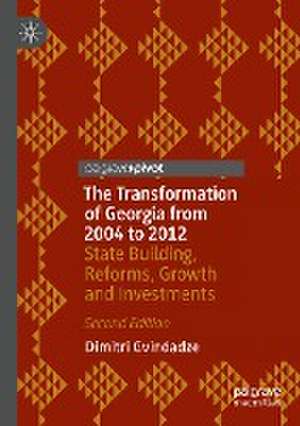The Transformation of Georgia from 2004 to 2012: State Building, Reforms, Growth and Investments
Autor Dimitri Gvindadzeen Limba Engleză Paperback – 30 noi 2023
| Toate formatele și edițiile | Preț | Express |
|---|---|---|
| Paperback (1) | 348.00 lei 6-8 săpt. | |
| Springer International Publishing – 30 noi 2023 | 348.00 lei 6-8 săpt. | |
| Hardback (1) | 354.17 lei 6-8 săpt. | |
| Springer International Publishing – 30 noi 2022 | 354.17 lei 6-8 săpt. |
Preț: 348.00 lei
Nou
Puncte Express: 522
Preț estimativ în valută:
66.60€ • 69.11$ • 55.66£
66.60€ • 69.11$ • 55.66£
Carte tipărită la comandă
Livrare economică 17-31 martie
Preluare comenzi: 021 569.72.76
Specificații
ISBN-13: 9783031182662
ISBN-10: 3031182669
Ilustrații: XIII, 191 p. 39 illus., 2 illus. in color.
Dimensiuni: 148 x 210 mm
Greutate: 0.25 kg
Ediția:2nd ed. 2023
Editura: Springer International Publishing
Colecția Palgrave Macmillan
Locul publicării:Cham, Switzerland
ISBN-10: 3031182669
Ilustrații: XIII, 191 p. 39 illus., 2 illus. in color.
Dimensiuni: 148 x 210 mm
Greutate: 0.25 kg
Ediția:2nd ed. 2023
Editura: Springer International Publishing
Colecția Palgrave Macmillan
Locul publicării:Cham, Switzerland
Cuprins
Chapter 1: Reforms, state building and the legacy.- Chapter 2: The Soviet Union – the twilight.- Chapter 3: 1991-2003: early Post-Soviet Transition and the Revolution of Roses.- Chapter 4: Georgia’s J-curve. How to rebound?.- Chapter 5: Russia.- Chapter 6: Public leadership.- Chapter 7: The Ten Commandments of State-Building.- Chapter 8: National governance.- Chapter 9: Size and effectiveness of a government.- Chapter 10: Structure of a public expenditure.- Chapter 11: Market-based approach in agriculture and healthcare.- Chapter 12: Pensions and public sector salaries.- Chapter 13: Public debt, capital markets and international assistance.- Chapter 14: Wealth generation, taxes, customs, trade and logistics.- Chapter 15: De-regulation, privatization, public services and competition.- Chapter 16: Banking.- Chapter 17: Territorial development and urbanization.- Chapter 18: Dollarization – a thought framework.- Chapter 19. Parliamentary elections in 2012.- Chapter 20. The marginof error.
Notă biografică
Dimitri Gvindadze was the Deputy Finance Minister and the Finance Minister of Georgia in 2005-2012.
Textul de pe ultima copertă
How can developing countries become high-income nations? What are the reference points for measuring national development, public leadership and government performance? What is the nexus between public policies and geopolitical, political, emotional, historical, national governance-related, social and cultural norms, forces and factors which shape the process of the state building? This second edition of the book elaborates on many of these critical interconnections, focusing on 9 years after Georgia's Revolution of Roses in November 2003. The book explains what can be accomplished in two electoral terms at a given starting level of GDP per capita and which pitfalls to avoid. It contributes to documenting an almost decade-long history of Georgia.
Dimitri Gvindadze was the Deputy Finance Minister and the Finance Minister of Georgia in 2005-2012.
Dimitri Gvindadze was the Deputy Finance Minister and the Finance Minister of Georgia in 2005-2012.
Caracteristici
Explains the main principles, factors and circumstances which shaped Georgia’s national governance and state building in 2004-2012 Provides a thought framework for reforming countries and modernizing economies, including post-Soviet economies Discusses paths of Georgia's economic convergence with high income countries and multiple factors influencing such economic convergence
